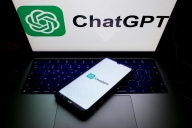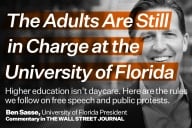You have /5 articles left.
Sign up for a free account or log in.
When I am asked how I am or how my day is going, my standard response is “too early to tell.” That retort usually elicits a chuckle the first time I use it and quickly devolves into eye-roll territory with subsequent uses.
If my friends and colleagues wish I would use “too early to tell” less, I wish others would use it more, especially the pundits whose job it is to ascribe significance to events in real time. The 24-hour cable news cycle has created a need to fill time and space with analysis from panels of “contributors” who are labeled as “experts” but more resemble talking heads. Most of them are quick to draw conclusions in real time, and most of them are ultimately proved wrong.
“Too early to tell” is probably the correct reaction to most events in the news. With the exception of cataclysmic events like Sept. 11, we rarely have enough perspective to determine when history is being made. It is too soon to conclude whether an item in the news is an isolated incident or the beginning of a movement.
So it is with three recent announcements in the college admissions world.
The first is Purdue University’s recent announcement that it will resume requiring applicants to submit test scores beginning in the fall of 2024. Is this a foreshadowing of the triumphant return of testing?
I’m thinking not. At a board meeting at school last week, prior to the Purdue announcement, I was asked if I thought that many colleges would return to requiring test scores. I replied that the colleges and universities I was aware of that had returned to requiring testing had done so for reasons that may not translate to other institutions. The Massachusetts Institute of Technology did so because it has a need to identify the kind of high-end math students it is seeking. Public universities in states like Florida, Georgia and Tennessee have done so not at the behest of admissions offices but rather the political appointees on state governing boards who apparently consider test-optional policies part of the woke movement.
I could certainly be wrong, but I’m thinking that the test-optional movement is unlikely to go away. While some überselective universities can require anything they want from applicants, most colleges run the risk of a decline in application numbers if they go back to requiring testing. That is especially true for colleges that rely on enrollment from California, given that the University of California and Cal State systems are ending the use of test scores in admission altogether. I suspect that application numbers are an even more important metric than test scores for most institutions.
The second news item is that several colleges and universities, including Washington & Jefferson, Colby-Sawyer and Lasell, have recently announced tuition resets. Washington & Jefferson is reducing its tuition by 44 percent, Colby-Sawyer by 62 percent and Lasell by close to a third.
A Hechinger Report article, also published in The Washington Post, quoted a vice president of the National Association of College and University Business Officers as predicting that as many as 100 colleges may move to lower their prices. I’d like to see that happen, because I’d like to see “counterprogramming” to the high-tuition, high-discount model that has prevailed in higher education. (I’d also like to see more counterprogramming with regard to a variety of admission practices.)
I wish those institutions well, but the history of tuition resets isn’t promising. Previous instances of colleges and universities hoping to lead a movement to lower prices (and lower the amount of aid they offer) have found themselves without followers, and there is a danger that lowering tuition may lead the public to see the lower price as a sign that the institution in question is in trouble. The broader issue, of course, is that we have to come to grips with growing public discontent about the cost of higher education. Those costs are spotlighted at a time when there is concern about inflation, especially given that the price of attending college has risen faster than any other sector over the past generation. Can we justify what we are charging for our product?
The most interesting story is that 11 law schools have announced that they will no longer participate in the U.S. News rankings. The group comprises Yale, Harvard, Stanford, Columbia, Penn, Georgetown, Michigan, UC Berkeley, UCLA, UC Irvine and the University of Washington.
The law schools all provided similar arguments for their decisions to no longer participate in the rankings. They argue that the ranking metric—40 percent reputation, 26 percent placement, 21 percent selectivity (including LSAT scores and college GPAs) and 13 percent faculty and library resources—discourages law schools from encouraging graduates to pursue careers in public service, and that the debt metric ignores loan-forgiveness programs for students who bypass corporate law and earnings or who pursue other graduate degrees after law school. They also suggest that the rankings metrics incentivize law schools to provide merit aid to students with high grades and test scores.
The larger question is whether the withdrawals portend the end of the influence of the U.S. News rankings, as suggested by articles in both Inside Higher Ed and The Nation, not only for law schools but perhaps for undergraduate institutions as well. The answer depends on which sports announcing legend you choose to quote.
If you are an optimist or a baseball fan, you might prefer to channel legendary St. Louis Cardinals and Chicago Cubs play-by-play announcer Harry Caray. While best known for his rendition of “Take Me Out to the Ball Game” during the seventh-inning stretch, his home run call began with “It might be, it could be.” If, however, your tastes run more to football or skepticism, you might turn to the wisdom of analyst and former college coach Lee Corso, fond of saying, “Not so fast, my friends.”
Is this the beginning of the end for U.S. News? It may be more appropriate to answer that question not with sports quotes but rather with metaphors from the entertainment world. The rankings are, after all, far more about entertainment than they are about journalism. They attempt to make news rather than break news.
I wonder whether the law schools in question will discover that U.S. News’ rankings are the higher education equivalent of the Eagles’ “Hotel California,” where you can check out any time you want but you can never leave. In the past, colleges that have attempted to withdraw from participation in the rankings, most prominently Reed College in Oregon, have not only been unable to opt out but have also been punished by U.S. News with a lower ranking. Will the withdrawing schools, many of which are universally considered top 14 law schools, face the same thing? Or will we see undergraduate institutions find the courage to follow in their footsteps and stop cooperating with the rankings?
U.S. News has already announced that it will continue to rank law schools out of “concern for students” rather than the revenue or publicity that the rankings bring to what once upon a time was a weekly newsmagazine. But are colleges obligated to help U.S. News with data collection when it could publish rankings based on publicly available information? As “Ethical College Admissions” has asked previously, how much does U.S. News vet the information it receives from colleges? And is U.S. News “too big to fail”?
Will we see a Netflix documentary or a major motion picture “inspired by a true story” based on the clash between law schools and the rankings? I can envision Bob Morse as the evil genius in a suspense or horror movie who won’t die, coming back to life just when the heroes think they’ve finally vanquished the threat to civilization and we assume the closing credits are about to roll.
Might there be an Oscar in his future? It’s too early to tell, but you heard it here first.








